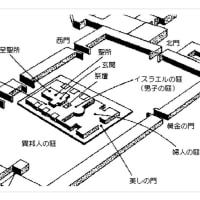25章 忍耐と自制
1.王の箴言
25章からは、古代イスラエルの王ヒゼキヤ王が編集したソロモン王の格言集です。ヒゼキヤといえば、ソロモン王から200年も後に登場する王です。その時代にソロモンの格言集が見つかり、それを書き写したものだ、というわけです。200年の間、どこにどのように埋もれていたのか、不思議でもあるのですが、ヒゼキヤは、この格言集が重要であると思い、ソロモンが書いたと思われる箴言の本体に付け加えたわけです。
そこでヒゼキヤの関心は、何よりも帝王学、つまり王としてどうあるべきか、また臣下の心得はどうあるべきかにあったようです。少し見てまいりましょう。
まず2節、神と王は、紙一重の存在のようですが、全く別物であると言います。日本の歴史においても、天皇を神として崇拝するように求められ、天皇を神と認めないキリスト教の牧師が弾圧を受けて殺された時代がありました。戦後、GHQが、連合軍のマッカーサー最高司令官と昭和天皇が並んで撮った写真を公開し、神道指令(政教分離指令)を発することによって、もはやそのような考え方は日本でもなされなくなったと思いますが、指導者が神格化されていく問題は、国家のみならず、大小を問わず、様々な組織で起こりうる問題です。力を握った者がまるで神のように崇められていく、そして傍若無人な振る舞いが許されてしまう。大切なのは、指導者の周りにどのような人たちがいるかです。「王の前から悪しき者を除け。」(5節)。つまり王のみならず、官僚もまた人間として正しい者でなければ、善政は成り立ちえないのです。
2.臣下の箴言
そこで王のしもべたち、つまり官僚に対する大切な心得が語られていきます。まず人間としての謙虚さを忘れないように。イエスも教えられたように(ルカの福音書14:7-11)、自分の名誉を求めるような人ではだめです。次に8節、急いては事を仕損じる、物事は慎重に扱う人であれ、ことに、告発があった時には、と。そして訴えがあった時には、事実関係をよく把握し、是々非々で対処することだと言います(9-10節)。冷静沈着さが求められるのです。本当に知恵ある人は、適切な時に、的確な言葉を発するものです(11節)。人を叱責する時には、「簡(かん)にして要を得た」ことばで、心に語り掛けることです(12節)。忠実さは、文句なしに称賛に値するものです(13節)。軽率な約束事をして人をがっかりさせないことです(14節)。「柔よく剛を制す」と言うように、優しく、思いやりをもって語り続ければ、頑なな心を開くこともできます(15節)。
16節には、誉め言葉もほどほどにしましょう。それは、ご近所だからと度々訪問されるのが迷惑なのと同じです(17節)。何よりも人の気持ちや心の内を、よく察して動くことでしょう。嘘偽りを言い広めることは、殺人に等しいことです。実際、根も葉もない虚偽りで、人生をめちゃくちゃにされることだってあるのです(18節)。しかしそうであればこそ、どんな人とお付き合いすべきかよく見極めることでしょう(19節)。知恵ある人は、他人の心をよく理解し配慮できる人です(20節)。また、敵が困っている時には助けてあげなさい(21-22節)。イエスも(マタイの福音書5:44)、パウロも(ローマ人への手紙12:20)同じように考えていました。神の愛の深さに生きる人であればこそ、そこに敵をも唸(うな)らせる人望が生じるからです。陰口は言わないことです。巡り巡って強く吹き付ける北風となって帰ってきます(23節)。神を恐れる正しい生き方を台無しにしないように注意しなさい。暗き世において、神を信じ誠実に生きる人は、光であることに間違いはないからです(26節)。どうでしょう。なるほどと思うことばかりですが、ヒゼキヤが選んだ格言集、いわば帝王学の要点は、忍耐と自制にあるのかもしれません。では今日もよき一日であるように祈ります。
<クイズコーナー>
最初に、昨日のクイズです。箴言の10-15章で、特徴的に使われている並行法は、次のどれでしょうか?①同義型並行法、②反意型並行法、③合成型並行法。答は②反意型並行法です。主として対照的な句が反意囲的に並べられています(10:1等)では今日の聖書クイズです。箴言16-22章で、特徴的に使われている並行法は、次のどれでしょうか?①同義型並行法、②反意型並行法、③合成型並行法。答えはまた明日。では今日もよき一日となりますように祈ります。
Chapter 25: Patience and Restraint
1. proverbs of kings
Beginning in chapter 25 is a collection of King Solomon's proverbs compiled by King Hezekiah, king of ancient Israel. Hezekiah was a king who appeared 200 years after King Solomon. One wonders where and how it was buried for 200 years, but Hezekiah thought it was important and added it to the body of proverbs that he believed Solomon had written.
So it seems that Hezekiah's concern was above all else with imperialism, that is, how a king should conduct himself and how his subjects should behave. Let us take a look at a few things.
First of all, verse 2 says that God and kings are two completely different things, although they seem to be one and the same. In Japanese history, there was a time when people were asked to worship the emperor as God, and Christian pastors who did not recognize him as God were oppressed and killed. After the war, GHQ released a photo of Supreme Commander MacArthur and Emperor Showa side by side and issued the Shinto Directive (Separation of Religion and State), and I believe that this kind of thinking is no longer practiced in Japan. However, the problem of deification of leaders is a problem that can occur not only in nations but also in various organizations, large and small. Those who hold power are worshipped as if they were God, and they are allowed to behave unchecked. What is important is what kind of people are around the leader. 'Remove the wicked from before the king.' (v. 5). In other words, not only the king, but also the bureaucrats must be righteous as human beings in order for good government to be possible.
2. the proverbs of the subjects
The king's servants, or bureaucrats, are to be taught important principles. First of all, remember to be humble as a human being. As Jesus taught (Luke 14:7-11), do not be a man who seeks his own honor. Next, verse 8, haste makes waste, and be a man who handles things carefully, especially when there is an accusation. He says, you must be aware of the facts and deal with it in a fair and reasonable manner (vv. 9-10). Calmness and composure are required. A truly wise person will speak the right words at the right time (v. 11). When rebuking others, we are to speak to their hearts with "expressing much in few words" (v. 12). Faithfulness is unquestionably commendable (v. 13). Do not disappoint others by making rash promises (v. 14). As the saying goes, " the soft overcomes the hard; and the weak the strong," and continued gentle and considerate speech can open stubborn hearts (v. 15).
In verse 16, praise should also be moderate. It is just as annoying to be visited often because you are a neighbor (v. 17). Above all, you will move with a good understanding of people's feelings and hearts. Spreading falsehoods is equivalent to murder. In fact, it is possible to have a person’s life ruined by a falsehood that has no basis in reality (v. 18). However, that being the case, we should be very careful about the kind of people with whom we associate (v. 19). A wise person is one who understands and is concerned about the feelings of others (v.20). Also, help your enemies when they are in trouble (vv. 21-22). Jesus (Matthew 5:44) and Paul (Romans 12:20) thought the same way. For it is only when a person lives in the depths of God's love that there arises a popularity that makes even his enemies roar. Do not speak behind their backs. It will come back as a strong north wind (v. 23). Be careful not to spoil the righteous way of life that fears God. For there is no doubt that in a dark world, those who believe in God and live faithfully are light (v. 26). What do you think? I see what you mean. Perhaps the main points of Hezekiah's aphorisms, so to speak, are patience and self-control. I wish you a good day.
<Quiz Corner
First, yesterday's quiz. In Proverbs 10-15, which of the following parallelisms is used in a characteristic way? (1) Synonymous parallelism, (2) antonymic parallelism, and (3) synthetic parallelism. The answer is (2) antonym-type parallelism. The primarily contrastive clauses are arranged in antonymy (e.g., 10:1), which brings us to today's Bible quiz. Which of the following parallelisms is used characteristically in Proverbs 16-22? (1) synonymous parallelism, (2) antonymic parallelism, and (3) synthetic parallelism. The answer will be given tomorrow. Then I wish you a good day.



















